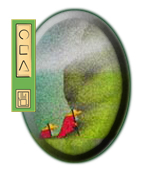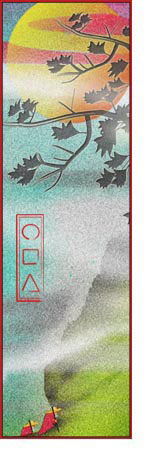On The Way: The Daily Zen Journal
Zazenron
Question: The main point of zazen is supposed to be that no thought arises. But if we check thought by thought, surely it is like washing off blood with blood.
Answer: The original and true state of the heart is said to be no thought arising. It is not checking thought, but neither is thought unchecked. It is just that thought does not arise. If one can really come to this original state, it is called the Buddha and dharma nature. After that there is no need even for zazen. There is no delusion and no satori—how should there be thought?
And if this true state is not attained, thought will inevitably arise. Even if thought is held down forcibly, it would still all be ignorance. A stone can press the grass flat, but after a time it rises again. This point must be deeply meditated upon; it is no easy thing.

Once the Buddha law is heard and faith is roused, all is well. But people with no heart for the true way are dull in their concentration and do not realize there is anything wrong. They may suppress some of their little thoughts, but they are not aware of the great thoughts. Since they do not cut off the source of them, they may make some good karma, but it is difficult for them to get free from life-and-death.
Question: You have said, do not think any thought of good or bad at all, and that having no thought of good or bad is the central point of zazen. What about the little thoughts and great thoughts of everyday life?
Answer: When it is said, do not think any thought of good or bad, it means directly cutting off. This is not to be done only at the time of meditation sitting; if you reach this state, then walking and standing and sitting and lying down are all Zen. You do not necessarily have to be in the sitting posture.
The Zen master says in the Shodoka poem that walking too is Zen and sitting too is Zen; talking or silent, moving or still, the body is at peace. A sutra says, “Be always in it, whether in the slow Zen walking or sitting or lying down.”
The so-called little thoughts are those that suddenly come up about things which are in front of us. The so-called big thoughts are those of greed, anger, foolishness, fame, profit, and so on. At the time of zazen, those of weak will suppress the little thoughts, but the great thoughts are in their hearts without their realizing it. Throwing away these bad thoughts is to cut off directly their root and source, and when you cut off that root and source directly, the passions become bodhi, foolishness becomes wisdom.
The three poisons of greed, anger, and folly become pure conduct, ignorance becomes the great knowledge of the nature. How could it not be so with the little thoughts also? This is what the Buddha meant when he said, “If it is you that make the thing turn, that is the Buddha.” You just have to make the thing turn, and not be made to turn by the thing. You must be the pivot on which the thing turns; do not make the thing the pivot on which you are turned.
Question: If to be Buddha is to be the pivot of the thing, what is that thing, and what is the pivoting?
Answer: The thing is the ten thousand phenomena, and to be the pivot is to be released from the body, not to agitate the heart in regard to any circumstance whatsoever, but instead to face the true nature. When circumstances do not clog the heart, heaven and spirits and demons and gods, passion and life and death, will all be nothing to you and this is called making the thing turn.

The essential point is not to let the heart be diverted by any thing. Even clinging to a Buddha or clinging to a dharma have to be cut off, how much more the delusive thoughts! Though the heart which does the cutting is in a way like a heart which is thinking, this is right thinking, the concentration which brings right vision.
Question: Passions and bodhi arise distinctly from the one heart. What is it that they come from?
Answer: Seeing forms, hearing sounds, smelling odors, experiencing tastes, feeling touch, knowing things—these are the powers of the five senses and mind the sixth. To set up an individual “I” in this, to bring up love and aversion, is all delusive sight. By this delusive sight there is attachment to form, and this is called illusion.
From this are brought up the five skandhas (form, feeling, perception, impulse, making discriminations); all this is called passion. When delusive thoughts arise even a little, at once turn that delusive thought to face the true nature, and then immediately it becomes mushin. If once you are able to be at rest in mushin, your body of five skandhas becomes the five-fold body of the dharma (discipline, meditation, wisdom, liberation, liberated vision).
This is what the Diamond Sutra means by not letting the heart settle down anywhere as home. If the heart is applied like this, it is the great spiritual training.
Question: If someone has the merit of having done zazen for a long time so that their concentration is matured, doubtless they will not have passions and wrong illusion in their heart. But for a beginner, how will the passions ever come to a stop?
Answer: Do not hate the passions, but simply purify your heart. An ancient has said that it takes a person of iron to train in the way. You must put your hand on your heart and then solve the riddle; do not concern yourself with rights or wrongs but go straight to the supreme bodhi-awakening.
Putting your hand on your heart means to make out what is correct and what is deluded in the heart. One who knows when the heart is astray is a wise person. When wisdom comes and illusion ceases to be, it is like bringing a light into a dark cave where the rays of sun and moon have never touched. That ancient darkness does not go somewhere else; it suddenly becomes light.
When the light of wisdom comes, darkness and ignorance and passions do not wait upon their going but are gone. At night the empty sky is dark, but when the dawn sun appears that sky becomes the day, becomes bright. The heart is like that. Illusion is dark, satori is bright. When the rays of wisdom shine, the darkness of passion all at once becomes bright. There is no second thing beside the bodhi.
Question: So it is by the power of wisdom that the darkness of passions is brightened, and without wisdom there is no bodhi. But how then can wisdom be obtained?
Answer: There is a light of wisdom which is naturally luminous and clear, but when covered by delusive thoughts it is lost and then illusion arises. When a person has a dream, everything in it is taken as real, but on awakening there is nothing there at all. Delusive thought is like a dream, and when regarded from the waking standpoint, it has never been there. Living beings are confused and take the delusion for reality.
Question: For a long time we have no satori, and suddenly we know it; do we then know things of the past and future as well?
Answer: When delusive views have all come to an end and there is a sudden awakening from the great dream, this is perception of the Buddha-nature, which is called the great satori and the great piercing through. This state is not accessible to ordinary thought based on distinctions. This body has been built up on past illusion, and supernatural powers which relate to it are not manifested by one who has seen the nature to be Buddha.
When satori comes, one shakes off the taint of the fields of perception of the five senses and the mind, and cuts off life and death. From that, he or she does have a supernatural power of inspired action.
Question: It is said that the nature is eternal and unchanging and one and the same in living beings and in Buddhas. Yet the living beings are in illusion with the pain of life and death. So can it be said to be one and the same?
Answer: It is one and the same under the light of wisdom, but not in the sight of ignorance. The words of the patriarchs are a tile to knock on the gate. Before the gate is opened, see the nature to be Buddha is the ultimate word, but when one goes in, all forms are left behind and even to be Buddha is meaningless.
Daikaku (1203-1278)
Excerpted from Zen and the Ways by Trevor Leggett





Anytime we read or hear or watch anything, the experience is always more true with our lights on.
Being a passive participant easily leads to a mindless outcome, and that is not the good kind of mindless we look at in practice. With the first question raised above, one asks: “Is that the main point of zazen?”
Being fully engaged as a student can be an enlivening experience.
“To set up an individual “I” in this, to bring up love and aversion, is all delusive sight. By this delusive sight there is attachment to form, and this is called illusion.”
All well said, and here once again, is the challenge of the experience of the “individual I.”
This is indeed a deep study.
Forward Ho,
Elana, Scribe for Daily Zen